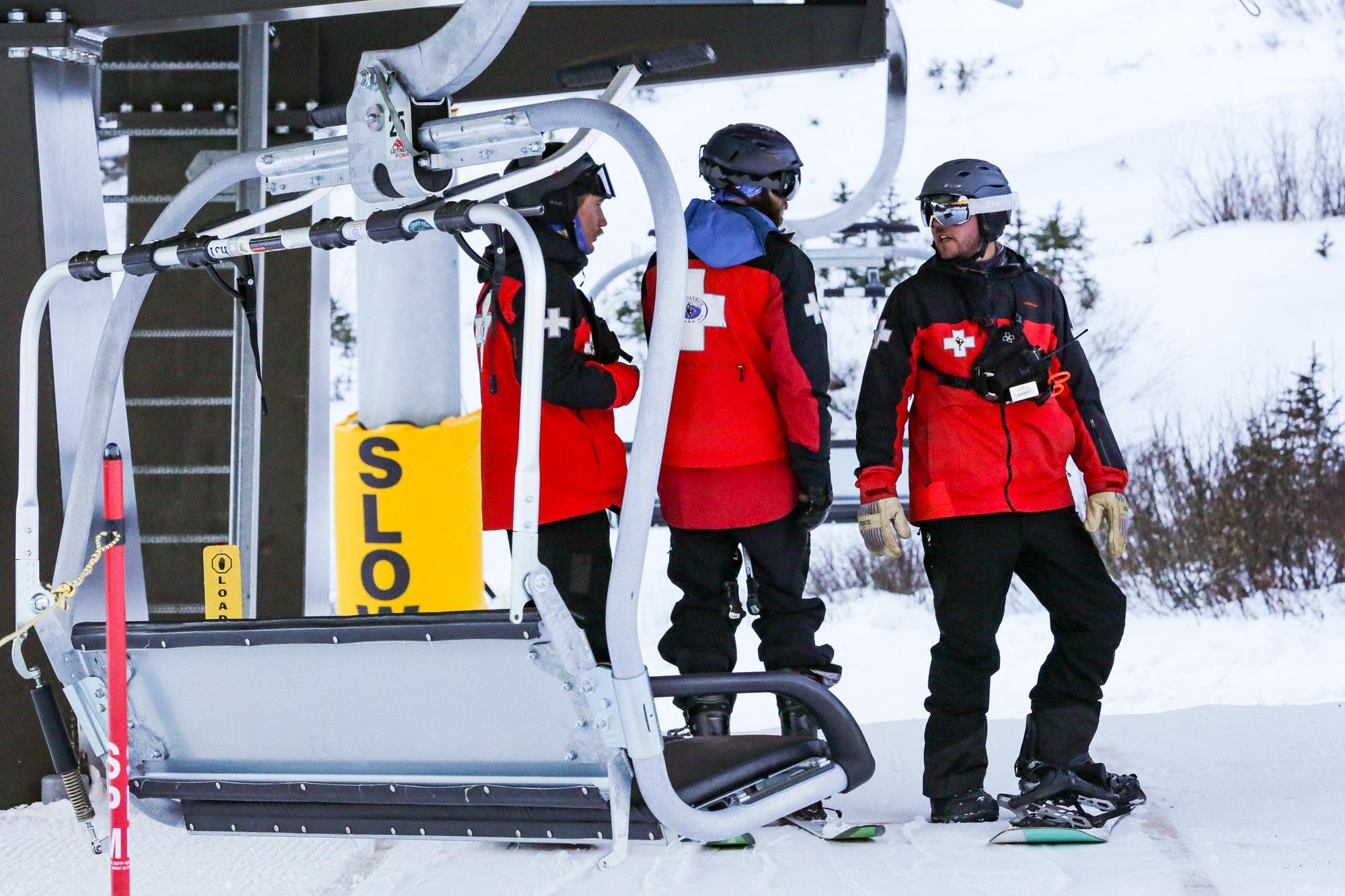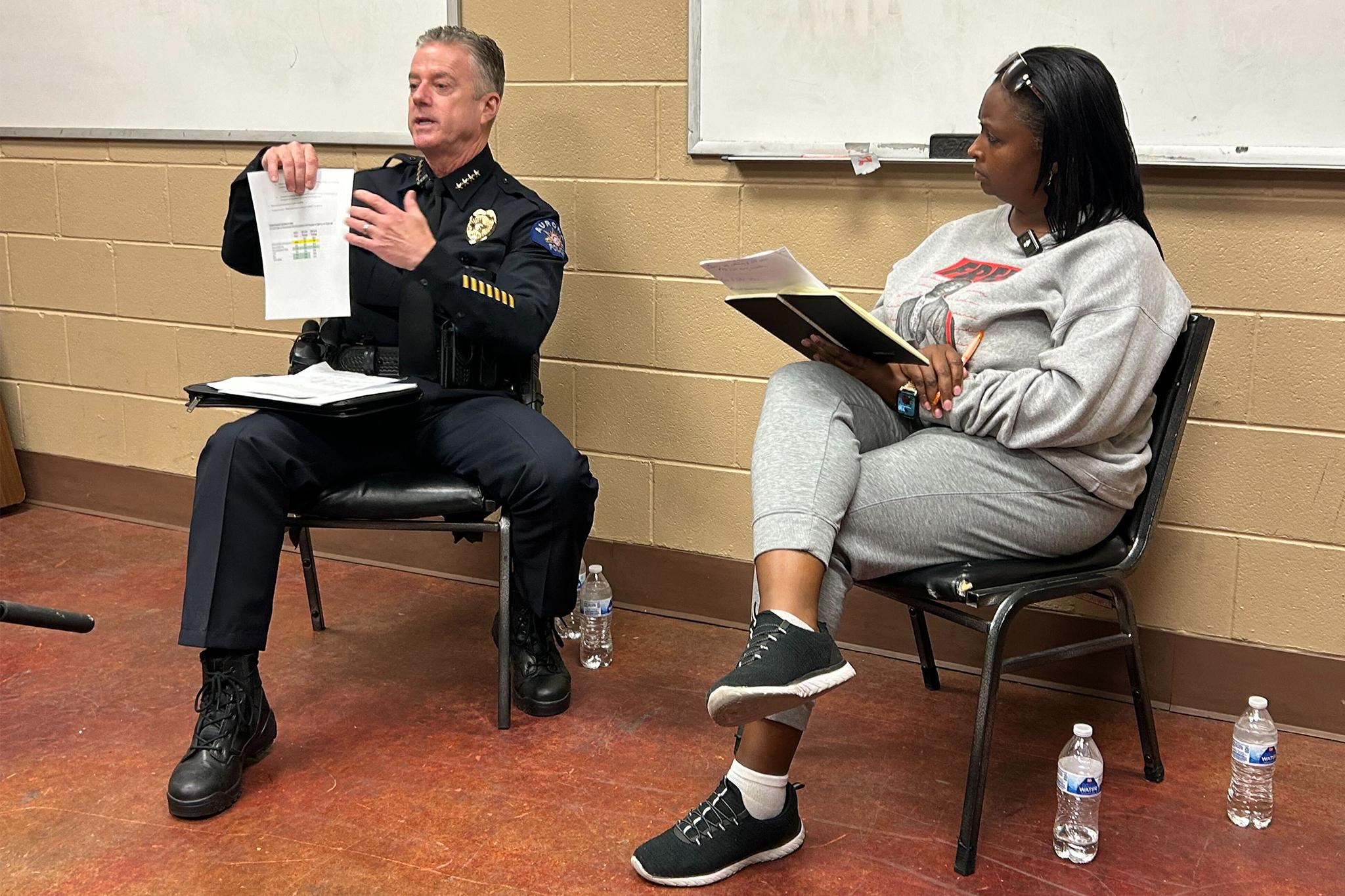
When MiDian Shofner attended the swearing-in ceremony of new Aurora Police Chief Todd Chamberlain on Sept. 9, she had her sign in her hands ready to protest his hiring.
What she didn’t expect was the newly appointed chief to approach her about a community discussion on police reform.
“I was out there demonstrating, and after that swearing-in [ceremony], he actually did come to me and extended his hand and we shook hands,” Shofner said.
She said that protest helps create space for discussion. “ It should challenge the leaders to say, ‘Let me lean in, let me actually ask more questions.’ And that's what Todd Chamberlain came and did.”
On Tuesday night, Chamberlain came and spoke to a small crowd of about 30, organized by Epitome of Black Excellence and Partnership at the Aurora Fire Station No. 2. And a protester turned moderator in Shofner. She is the CEO of the Denver-based advocacy group, Epitome of Black Excellence and Partnership.
For the second time in two weeks, Chamberlain opened the floor for questions from the crowd.
Aurora’s Black community has voiced its distrust in APD in recent years due to a pattern of racial profiling tactics from officers. The death of Elijah McClain prompted the Colorado Attorney General’s Office to put the APD under a consent decree. It was no surprise, then, that Chamberlain fielded questions about the decree, the department’s use of force and white privilege.
Before the discussion began, Shofner told the group that its small size was intentionally organized in order to promote dialogue.
“I just want to make sure that each and every one of us is grounded in the fact that we are here to lean in intentionally, candidly, boldly,” Shofner said. “And we are looking to give and receive perspective. So, there needs to be reciprocity in the room if this is going to be something that we all can walk away and say that we did collectively.”
Chamberlain responds
As part of questions prepared before the discussion, Chamberlain responded to the latest progress report on the Aurora consent decree. A section of it discusses problematic issues with the shooting of Kilyn Lewis, an unarmed Black man, who was shot and killed by an Aurora PD officer as SWAT teams attempted to arrest him on a warrant for attempted homicide.
The report raised questions on Aurora’s SWAT team executing a Denver warrant, lack of less lethal options, lack of cover, and the retention of the officer who shot Lewis, Micheal Dieck. Chamberlain said warrants outside of the city’s jurisdiction will be under more scrutiny. He said he’s in the process of creating a SWAT after-action report that evaluates the team’s process in responding to warrants.
“It's going to show who was involved. It's going to show a timeline specifically on intervention techniques such as crisis negotiations teams, so we can see a timeline that reflects it,” Chamberlain said. “It's also going to talk about the less lethal tools, which is one of the events that was also listed in there, different options, what was used, what wasn't used.”
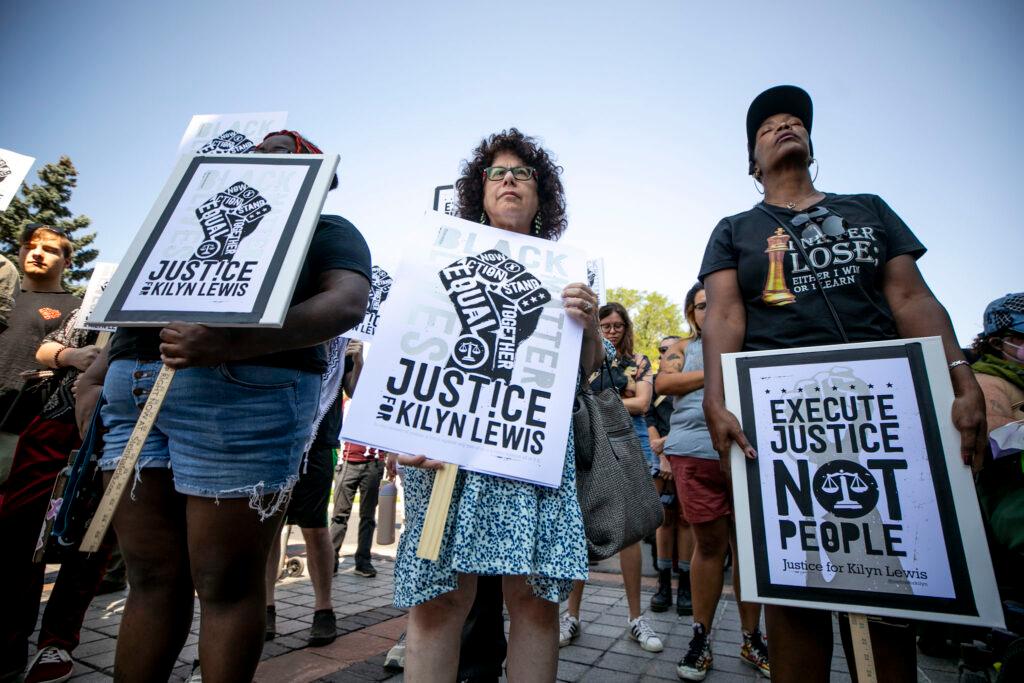
Arapahoe County District Attorney John Kellner declined to file criminal charges against Dieck. Despite the recent decision, the accountability and transparency sections of the progress report were unaffected. Lead monitor Jeff Schlanger said they’re waiting for the administrative investigation into the incident to finish in order to make a final determination.
“We haven't made any determinations with respect to this particular shooting or in fact the investigation or review of the shooting,” Schlanger said. “We're waiting for the administrative investigation to be concluded and for the Force Review Board assessment to be concluded before we make any assessment relative to those two areas of and review.”
Another shooting case
The shooting of Corey Dillard also came up Tuesday night during a discussion about the use of force. Officers shot and killed the 37-year-old combat veteran after pointing a replica AR-15 at them. APD said Dillard had gotten into a fight while attempting to steal a car and threaten community members in the area. At the time, his girlfriend had kicked him out of their apartment and was living in his car.
Dillard’s girlfriend and others said he was experiencing a mental episode. They questioned why officers didn’t use other de-escalation tactics. Chamberlain said it’s easy to see what could have been done differently in both shootings.
“Now it's easy to sit here and talk about it being a phone, or yes, now it's easy to sit here and talk about it being a simulated error, air assault pistol or rifle or whatever it is. But at the time when that officer had to make that decision, what was their perspective?” Chamberlain said. “The way we try to improve it is through constant training, through review, through analysis. Again, these force review things that we do, it is to call out the problems that we see.”
Distrust in Aurora’s Black community
Last year, three trials resulted in two former Aurora Fire and Rescue paramedics and an APD officer convicted and two other APD officers acquitted for their involvement in the death of Elijah McClain. Former APD officer Randy Rodema was convicted of negligent homicide and third-degree assault for his involvement in the 23-year-old Black massage therapist’s death, who was unarmed.
Former Aurora Fire paramedic Peter Cichuniec received the stiffest penalty of five years in prison for negligent homicide and second-degree assault, unlawful drug administration. But, Adams County Judge Mark Warner vacated the sentence and released Cichuniec on four years probation after serving 10 months. Roedema and former Aurora Fire paramedic Jeremy Cooper are appealing their convictions.
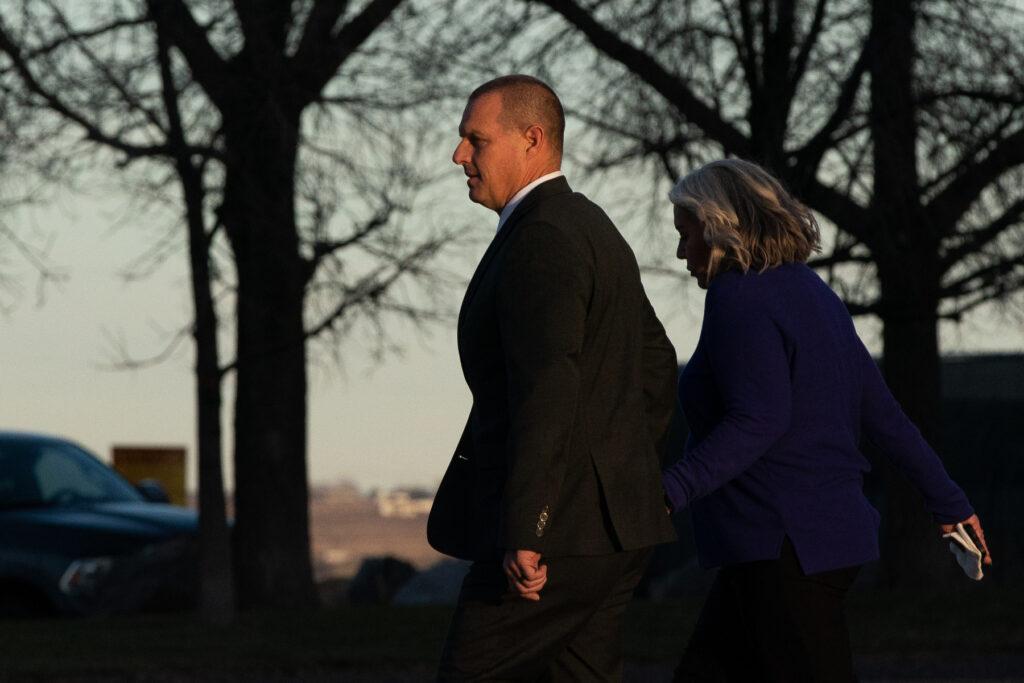
The latest progress report says APD is 73 percent in compliance when addressing racial bias in policing. The Monitor is considered on the right track in that area.
“I know that might not mean a lot. But, it means a lot to me and it means a lot to those officers that are having that discussion and hopefully changing the way they talk to people, how they work with people, what they do,” Chamberlain said.
Last week’s meeting
Last week, state Sen. Rhonda Fields hosted a meet-and-greet at the Dayton Opportunity Center. Many of the questions and concerns focused on APD officers’ presence at former President Donald Trump’s rally at the Gaylord Rockies Resort and Convention Center and immigration issues. Chamberlain also faced criticism for a photo-op with Trump.
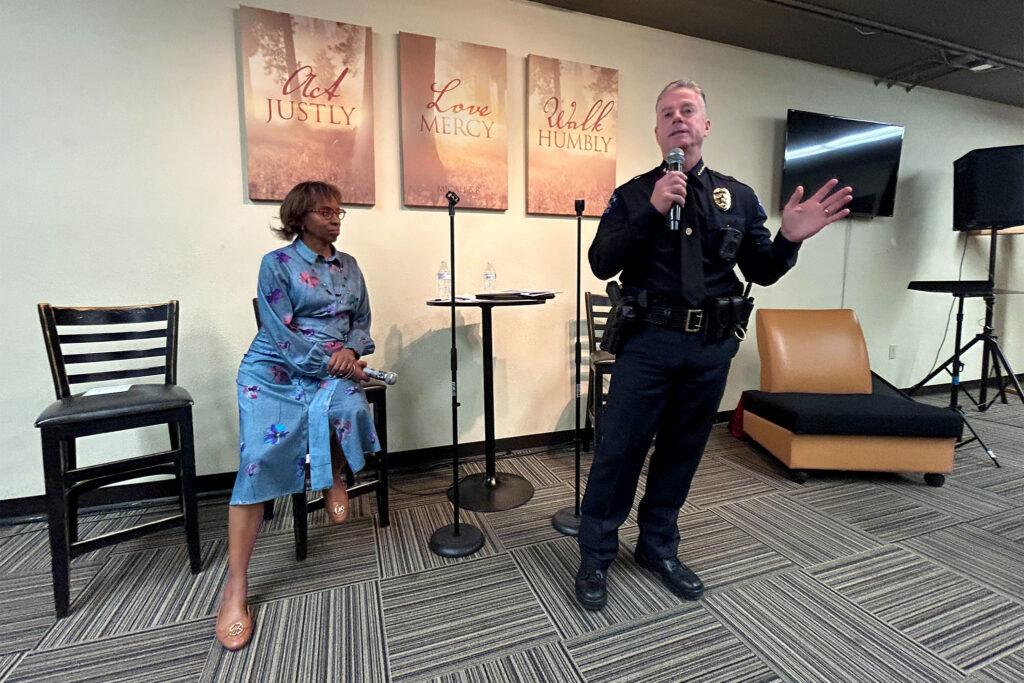
Many have voiced their displeasure with APD recruiting officers at a political event where Trump made remarks about a Venezuelan prison gang taking over apartment complexes in Aurora. The GOP nominee’s comments were considered xenophobic and gave the city a bad reputation.
Chamberlain responded on X, formerly known as Twitter, and at the meet-and-greet that APD has no political affiliation and listed off events where APD has recruited officers. He addressed those concerns again at Tuesday’s discussion.
‘Where the conversation needs to start’
In relation to the Trump rally and Chamberlain’s photo with the GOP presidential nominee, Nicole Taylor raised a question on who advises him on communicating with communities of culture, which opened a discussion about white privilege. Chamberlain said that he knew what the phrase meant and didn’t believe he had it. His response drew groans from the room.
“I think it's imperative of all of us in the communities of culture to have an understanding of where our conversation is starting,” Taylor, who is the community relation director for the Office of the Independent Monitor in Denver. “And if folks that are in positions of authority that happen to be of the Caucasian persuasion don't have an ownership of having white privilege just because they are, then that tells you where your conversation needs to start.”
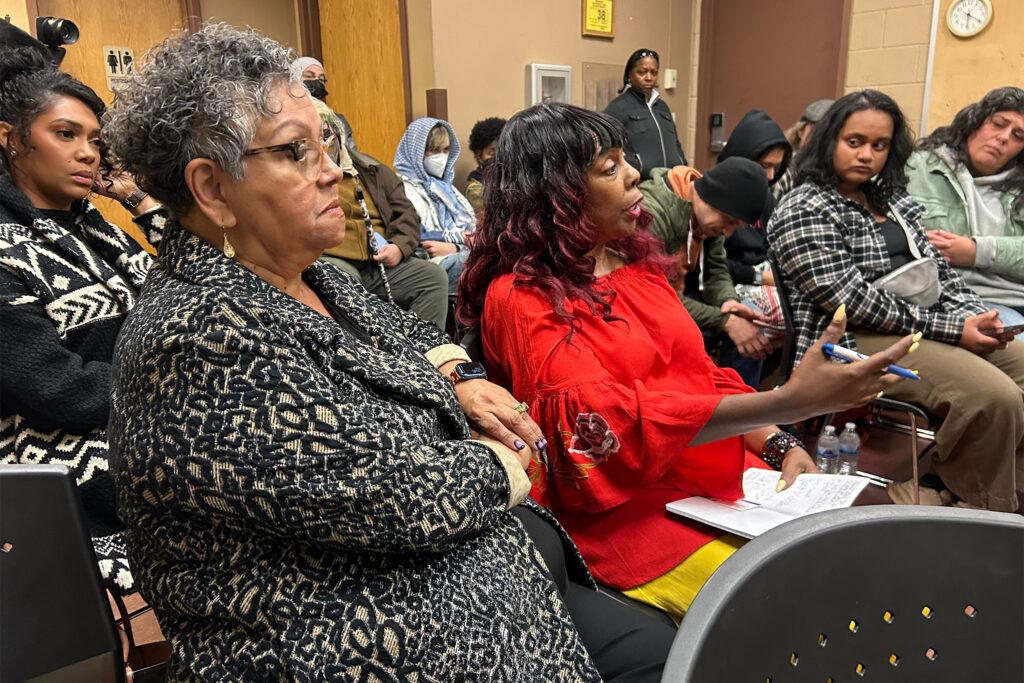
Taylor believes Chamberlain has good intentions but doesn’t have the foundation of understanding to make an impactful change yet.
“I think that with the ongoing conversations and the community feeling that they can speak out, that he will listen to be heard, and then change can happen. But it's not going to be overnight,” Taylor said.
Ends with a handshake
Topazz McBride, an elder at Restoration Christian Fellowship, attended both discussions. She said she still has reservations about Chamberlain. But she feels better about his post after Tuesday night.
“I heard him say that he's looking at things on a case-by-case basis, and what he's expecting of his officers is more accountability and the training that he is saying that he's going to implement as it relates to addressing biases, implicit biases, micro bias, all of those things is important,” McBride said. “And then his willingness to be here in this room, that was pretty courageous of him. He showed up by himself. No other officers with him.”
At the end of the discussion, Chamberlain shook hands with Shofner and committed to participate in more community discussions. He said he’ll also try to get his command staff involved.
“It can't just be me. I could come and keep telling you the same thing month after month or year after year,” Chamberlain said. “You have to talk to the people that have commands that need to hear the same discussions, need to have the same opportunity to give their perspective and their point of view.
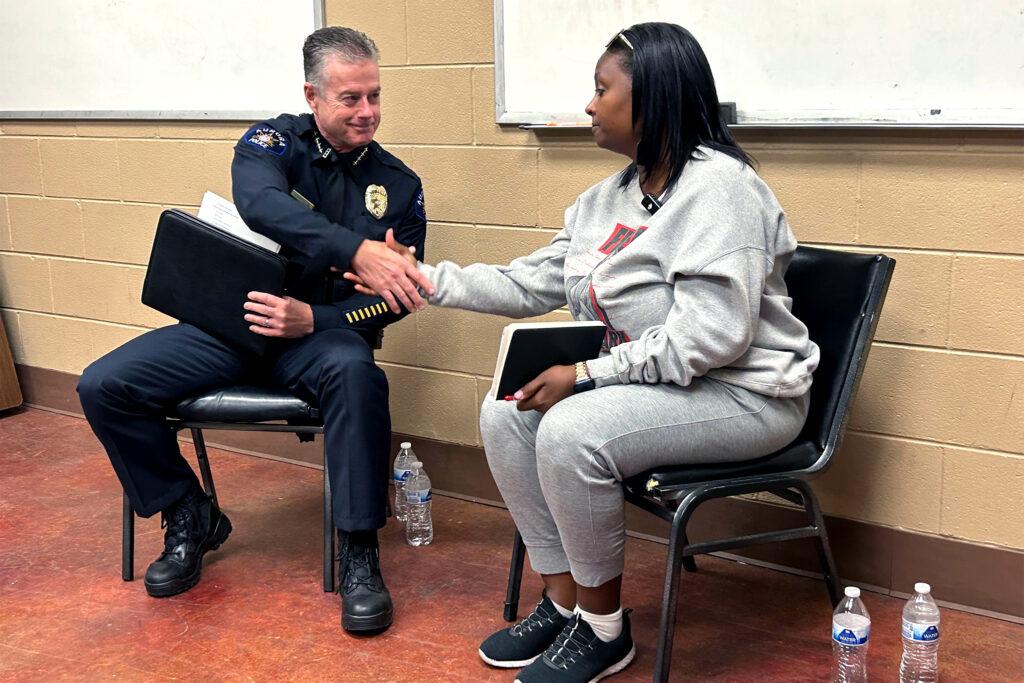
Afterward, Shofner the conversation was the first of many steps in APD regaining the community’s trust.
“These are spaces that they actually should be creating in that bold way so that the community can actually come and learn and have an understanding of what level of emotional intelligence, what level of cultural competency, what level, level of cultural humility do we have in the leaders that are supposed to be protecting us or supporting us or representing us,” Shofner said. “So with that, I think that tonight was definitely a first step in a long journey that Chief Chamberlain will have as he tries to continue to build trust in a system that he inherited that is broken in trust.”
Shofner said her team will plan similar events in the future. She hopes to find collaborative partnerships with other organizations to ensure more community voices are heard.
- New Aurora police chief talks about the Trump rally recruiting, immigration during public event
- Aurora names new police chief after years of turnover
- Aurora lawmakers slated to ratify permanent police chief hire Monday
- The City of Aurora formally introduces Todd Chamberlain as the permanent police chief
- Aurora City Council approves new police chief amid community protests







